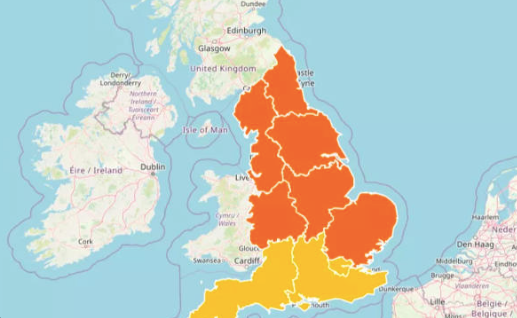
January 2, Friday 2025: The Met Office has issued a rare amber alert for England as temperatures decline. The UK Health Security Agency issued a joint warning with the national forecaster for all the regions of the country ahead of the heavy snow and bracing temperatures.
England is facing a rare amber weather warning issued by the Met Office, which will indicate the severity of events in terms of potential severe weather causing possible disruptions. This alert is in force from noon on Saturday, January 4, 2025, until 9:00 AM on Monday, January 6, 2025. The UK Health Security Agency has also issued a yellow cold weather health alert for the North East, North West, Yorkshire and the Humber, East Midlands, West Midlands, East of England, London, South East, and South West. The forecast claims that heavy snowfall will be one of the factors, with accumulations up to 30 cm (about 12 inches) in parts of the Midlands, Wales, and northern England, particularly over higher ground. Severe weather could adversely impact travel with significant road delays, car stranding, cancellations on the railways and in the air, power cuts, and rural community isolation.
In addition to this amber warning for snow and ice, the yellow warnings in place apply for most parts of England and Wales, southern Scotland, across these same days. Heavy snowfalls combined with high winds increase the risk of a blizzard event and associated drifting snow – thereby worsening problems getting around in traveling. There has already been widespread disruption across the UK due to recent severe weather. In Greater Manchester, flooding has led to the declaration of a major incident, with evacuations and road closures. More than 80 mm of rain has fallen, leaving roads and homes submerged.
UK Health Security Agency advises people, especially those over 65 years old or with underlying health conditions, to take precautions during this cold spell. This includes proper heating of homes, staying warm, and checking on vulnerable individuals.
In the event of possible massive disruptions, it would do well to observe local weather updates, heed official warnings, and plan travel. The most accurate updates can be accessed through the official sites of the Met Office and the UKHSA. Keep Reading Questiqa Wolrd for more updates




